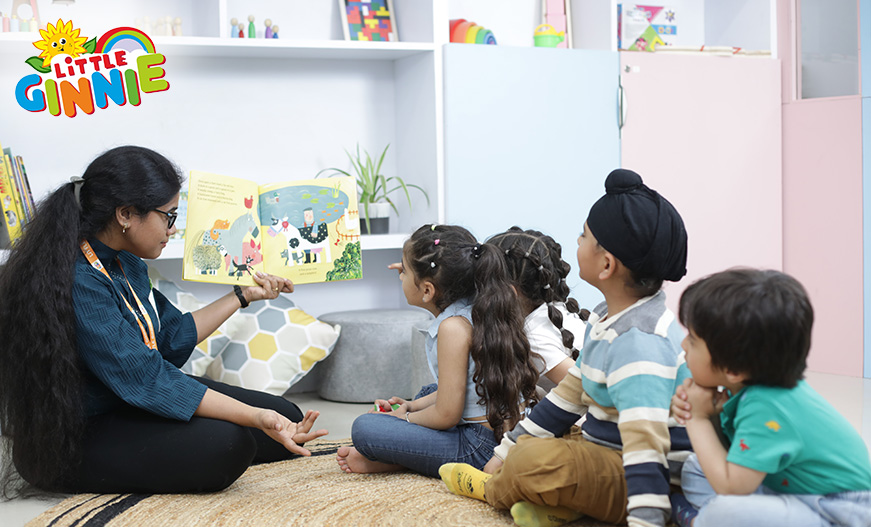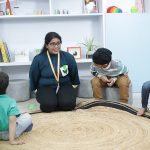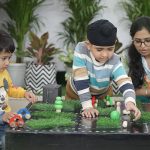
Have you ever wondered what sets successful people apart from the rest? What is it that helps them succeed in their pursuits and achieve their goals? Well, it all starts with early childhood education. That’s right! The preschool education programs that children attend in their early years play a significant role in shaping their future.
But have you ever wondered what makes these programs effective? What are the fundamental principles that guide quality preschool education?
In this article, we’ll explore the answers to these questions and more, so you can gain a better understanding of how your child’s early education can set the stage for their future success.
Learning Through Play: The Foundation of Preschool Education
One of the cornerstones of high-quality preschool education is the concept of learning through play. Play is not simply a frivolous activity for young children; it’s their primary mode of exploration and discovery. Through play, children:
- Develop Social SkillsThey learn to cooperate, share, take turns, and resolve conflicts.
- Practice Language SkillsThey expand their vocabulary, engage in conversations, and develop storytelling abilities.
- Enhance Cognitive SkillsThey solve problems, experiment with cause and effect, and develop critical thinking abilities.
- Enables Creativity and ImaginationThey explore new ideas, express themselves artistically, and build confidence in their abilities.
- Refine Motor SkillsThey develop fine motor skills through activities like drawing and building with blocks and improve gross motor skills through active play.
Core Principles in Action: What to Look for in a Preschool Program
Preschool programs that prioritize play-based learning typically incorporate the following core principles:
- Curriculum Aligned with Child DevelopmentThe curriculum should be developmentally appropriate, catering to the specific age group and natural learning pace of young children.
- Focus on Active LearningChildren should be actively engaged in the learning process, participating in hands-on activities, exploration, and discovery.
- Integration of Learning DomainsLearning shouldn’t be compartmentalized. Activities should integrate various developmental domains, such as literacy, math, science, social-emotional skills, and physical development.
- Small Class Sizes and Individual AttentionSmaller class sizes allow for more personalized attention from teachers, catering to individual learning styles and needs.
- Qualified and Caring EducatorsPreschool teachers play a critical role in promoting a positive learning environment. Look for educators who are qualified, experienced, and passionate about early childhood education.
- Safe and Stimulating Learning EnvironmentThe preschool environment should be safe, clean, and well-organized, offering a variety of materials and spaces for exploration, creativity, and social interaction.
Beyond Play: Additional Considerations for a Holistic Preschool Experience
While play forms the foundation, a well-rounded preschool program also incorporates other elements to ensure a holistic learning experience:
- Social-Emotional LearningPreschool programs can help children develop self-awareness, manage emotions, build healthy relationships, and practice positive social skills.
- Literacy DevelopmentActivities like storytelling, rhyming games, and exposure to books can spark an interest in reading and writing at an early age.
- Math ConceptsPlay-based activities can introduce preschoolers to basic math concepts like counting, sorting, shapes, and patterns.
- Science ExplorationProviding opportunities for exploration and experimentation allows children to develop curiosity about the natural world around them.
- Physical ActivityRegular physical activity is crucial for young children’s physical development and overall well-being.
The Benefits of High-Quality Preschool Education
Research consistently highlights the benefits of high-quality preschool education programs. Here are some key advantages:
- Improved Academic PerformanceChildren who attend preschool programs often demonstrate stronger academic performance in later years.
- Enhanced Social and Emotional SkillsPreschool can help children develop better social skills, emotional regulation, and self-confidence.
- Positive Impact on Brain DevelopmentEarly learning experiences can have a lasting positive impact on brain development and cognitive function.
- Reduced Risk of Developmental DelaysPreschool programs can help identify and address potential developmental delays early on.
- Preparation for Kindergarten and BeyondPreschool can equip children with the social, emotional, and academic skills necessary for a smooth transition to kindergarten and future learning.
Choosing the Right Preschool Program for Your Child
With so many preschool programs available, choosing the right fit for your child can feel overwhelming. Here are some tips to guide your decision-making process:
- Research Preschools in Your Area Consider factors like location, program philosophy, curriculum, class size, and teacher qualifications.
- Schedule School VisitsVisiting schools allows you to observe the classroom environment, interact with teachers, and get a sense of the overall program.
- Talk to Other ParentsSeek recommendations from friends, family members, or other parents whose children attend preschool.
- Consider Your Child’s Individual NeedsConsider your child’s personality, learning style, and any specific needs they may have. Choose a program that is a good fit for their temperament and interests.
- Trust Your Gut InstinctUltimately, the decision of which preschool program is right for your child is a personal one. Pay attention to your gut feeling and choose an environment where you feel confident and comfortable leaving your child.
A Look at Different Preschool Philosophies
There are various preschool education philosophies, each with its own approach to learning. Here’s a brief overview of some popular approaches:
- MontessoriMontessori programs emphasize self-directed learning, hands-on exploration with specialized materials, and individualized instruction.
- WaldorfWaldorf education focuses on creativity, imagination, and artistic expression through play, storytelling, and nature-based activities.
- Reggio Emilia This approach values collaboration, exploration, and project-based learning. The classroom environment plays a significant role, with a focus on open spaces and natural materials.
- Play-Based LearningAs discussed previously, play-based learning is a core principle in most high-quality preschool programs. This philosophy emphasizes the importance of play as a primary vehicle for learning and development.
The Final Note
Enrolling your child in a high-quality preschool program can be a valuable investment in their future. These programs provide a nurturing environment that nurtures curiosity, exploration, and a love for learning. By understanding the core principles of preschool education and carefully selecting a program that aligns with your child’s needs, you can set them on a path to success in school and beyond.
Do you have any questions about choosing a preschool program for your child? Share your thoughts and experiences in the comments section below!
FAQs
Q: What is the ideal age for preschool?
A: The ideal age for preschool can vary depending on the child’s individual development and your family’s needs. Many children start preschool between the ages of 3 and 5.
Q: How much does preschool cost?
A: The cost of preschool can vary significantly depending on factors like location, program type, and class size. Public preschool programs may be free or low-cost, while private preschools can be quite expensive.
Q: Are there financial assistance programs available for preschool?
A: Some government programs and community organizations may offer financial assistance for preschool. It’s important to research options in your area to see if you qualify.
We hope this article has provided you with valuable information about the core principles of preschool education programs and how to choose the right program for your child. Remember, a high-quality preschool experience can play a significant role in shaping your child’s development and setting them on a path to lifelong learning.












